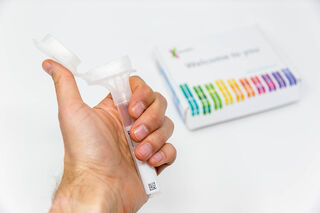Genetics
Insights into Approaching Newly Discovered Genetic Kin
Research offers a framework for what to expect when DNA tests reveal new family.
Posted June 24, 2020 Reviewed by Gary Drevitch

In researching my book The Lost Family: How DNA Testing Is Upending Who We Are, I communicated with hundreds of people whose DNA tests had revealed new close family members. Many wanted to approach these newly discovered relatives, but weren’t sure how they’d be received, and they were right to be cautious – some seekers of genetic family are met with open arms, while others meet with suspicion or rejection. As I listened to their stories of heartfelt reunions and painful rifts, I thought of how approaching biological kin can be like a roulette wheel, with high stakes and little control over the outcome.
Insights from the collective experiences of early adopters of this technology can illuminate a clearer path for those navigating this complex territory. What follows is not comprehensive – much more research is needed – but may serve as a framework for those in the midst of this profound social phenomenon. At the very least, consumers who encounter significant surprises may feel less alone in their attempts at reunion if they know the breadth of other testers’ experiences.
The number of people who experience surprising results from recreational DNA testing is significant. I estimate conservatively that about 1 million of the more than 30 million people who have taken recreational DNA tests have discovered either that the man they call Dad is not their genetic father or that they have a previously unknown sibling. A Pew Research Center study last year found that more than a quarter of testers discovered new “close relatives” – a looser definition with a much higher outcome.
These surprises, of course, are only the beginning of the story. My research suggests there are several key factors in how people respond to DNA revelations, and how much openness, goodwill, and desire for reunion they bring to their genetic kin in the wake of these revelations.
One factor that often affects how a person feels about a DNA revelation is how much agency she or he had in making the discovery. Those who tested their own saliva through a DNA kit and worked to unravel a family secret often expressed feeling more empowered by knowing the truth than those who had the news thrust upon them. Autonomy in the process of discovery helps in more than one way. First, a person seeking understanding may spend weeks or months unraveling her biological connections through genealogical research and social media sleuthing, giving her time to process the news on her own terms. Plus, autonomy means you set the timeline, deciding whether and when to make contact.
Besides, choosing to test and then deciding what to do with what you discover means you’re in charge of your own story. Even if the news a person receives via spit kit is at first unwelcome or upsetting, the process of managing that discovery and incorporating the news into a person’s life story means she is making meaning out of her own experience, and reclaiming her personal narrative.
Additional factors that influence how a person feels about a genetic revelation are that person’s relationship to the secret and the nature of the secret itself. I found that when people discover unexpected news that is fundamentally about them – for instance, that one of their parents isn’t genetically related to them, which is known as an NPE, for “not parent expected” – they are usually glad to know the truth because it is central to their own identities. The truth helps them come to more accurate and authentic understandings of themselves. As Catherine St. Clair, founder of a nonprofit called NPE Friends Fellowship, has put it, “I would rather live a difficult truth than a comfortable lie.”
But what if the secret is already known to the person being contacted, and is something he or she has spent decades not speaking about? Or what if the revelation promises to take that person over agonizing emotional terrain? When pain, shame, trauma, or cultural stigma are attached to the secret being uncovered, or when a revelation appears to threaten bonds with other family members, men and women may reject relationships with their genetic children, or may even reject acknowledging them altogether. One adoptee recounted that in one of her phone calls with her genetic father, the man said their conversations were getting him in trouble with his wife. He ultimately had his lawyer send her a “discontinuance of contact” letter.
In other cases, genetic revelations may seem to threaten the identity of the person being sought. “We all tell ourselves stories about who we are, and we pick and choose what fits into that story,” another consumer of genetic testing reflected after briefly connecting with her biological father, a religious man who said he felt terribly guilty about having had a child he hadn’t known about. Shortly after their only phone conversation, the man deleted his test and turned down any more contact. “I feel like I don’t fit the narrative that he’s chosen,” she said.
And, in turn, aunts, uncles, cousins, and half-siblings may follow the cues of their loved ones in deciding whether and how to have relationships with the person coming suddenly into their lives. The discovery of a previously unknown genetic relative may conflict with long-held beliefs about a parent. Or, it may simply introduce a painful reckoning that is too difficult to tackle, for months or years or ever. It may come after a parent has died, and is unable to answer questions, which can make reconciliation especially difficult. (“Our mother wouldn’t do that,” one adoptee says her newly discovered half-siblings told her after she reached out to introduce herself as their sister, who’d been placed on a pastor’s doorstep as a newborn.)
Yet, families are not monoliths. Often there is at least one person in a family – a half-sibling, a first cousin – who is open to knowing the person seeking family, and can serve as a source of information, connection, and love.
And sometimes, of course, genetic kin embrace their newfound family member. These stories are moving and hopeful. A man named Jeff described the discovery that he’d unwittingly conceived a child while in high school three decades earlier as something of a miracle when his adult daughter contacted him after taking an AncestryDNA test. Jeff’s years living with debilitating illness had taught him that guilt and shame were wasteful emotions, he told me; he viewed his daughter's arrival with gratitude and joy. Another man told me about being embraced by the genetic father he discovered in his forties; the man’s blended family, which made no distinction between full, step-, and half-siblings, began inviting him to holiday celebrations and kids’ recitals. In these and other stories, the culture of a family can play a role in welcoming a newcomer.
I’ve written elsewhere that the countless hard-won reconciliations happening across America right now suggest that the age of DNA testing may ultimately be moving us toward a more expansive and inclusive understanding of family. This is not to say that happy endings are always possible, or to suggest that every person impacted by a DNA discovery will or should see the revelation as a good thing. Each person decides for himself or herself how to define these relationships, and how to feel about the technology that brought them to light.
But as more of these stories become public, and more people experience them within their own networks, there’s no question we are coming to understand the past better – its cruelties and its moments of grace. And that means we have the opportunity to better understand the present, too. DNA testing is reshaping our culture, family by family.




